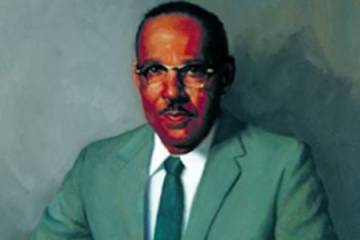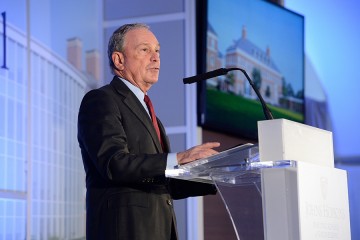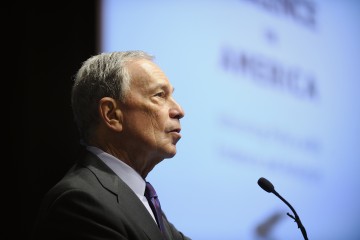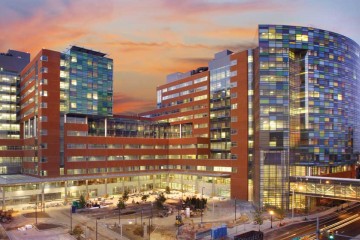Nearly nine years after launching the Bloomberg Distinguished Professorships program, Johns Hopkins University announced today that it will recruit an additional 50 world-class scholars to the faculty, doubling the current cohort of BDPs who are fostering collaboration across the institution while studying some of humanity's greatest challenges.
Most of the new BDPs will be recruited to work in faculty-developed interdisciplinary clusters to conduct transformational research in crucial fields such as artificial intelligence, the health effects of climate change, racial equity, neuroscience, and pandemic preparedness and response. The clusters will also expand training programs and convene scholars from across the world in these areas.
This next phase of the program—made possible by a new investment from the program's founding donor, Hopkins alumnus Michael R. Bloomberg—will make the BDP program will be the largest of its kind in the nation.
In a message announcing the expansion of the program to the JHU community, President Ron Daniels, Provost Sunil Kumar, and Vice Provost for Research Denis Wirtz wrote that the success of the first 50 BDPs—who are working in critical areas such as cancer research, health and environmental equity, and global food systems—has exceeded all expectations.
"They have emerged as leaders at every level of our institution, pursuing novel avenues of research that have reshaped policy and thought around the world, developed new treatments, and expanded our scientific knowledge," they wrote in a message to the university community today. "Mike Bloomberg's extraordinary willingness to build on that success is testament to his confidence in the capacity of all our Johns Hopkins faculty to pursue ideas that will have the greatest impact. We are honored to take up that challenge and deeply grateful for his transformational support for Johns Hopkins."
Like the first 50 BDPs, the incoming cohort will serve as academic bridges by holding appointments in at least two schools or divisions across the institution. Recent pioneering work by current BDPs includes leading in the generation of the first complete assembly of a human genome to date; discovering and characterizing new planets outside of the solar system; demonstrating the role of aging in cancer development; developing cutting-edge gene editing technology; and driving the national conversation on health equity.
This second BDP gift also includes an endowment to support cutting-edge equipment and core facilities at Johns Hopkins. This will equip faculty with the best tools and spaces to provide greater opportunity for creative collaboration among senior faculty, graduate students, and post-doctoral scholars.
"Our most pressing global challenges span many fields and geographies—and to take them on, we need more talented researchers who can do the same," said Bloomberg, founder of Bloomberg LP and Bloomberg Philanthropies and the 108th mayor of New York City. "The Bloomberg Distinguished Professors at JHU have made important strides already, on climate change, public health challenges, racial and economic inequities, and so many other issues. To make even more progress saving and improving lives, I'm glad to expand the program and help bring new groups of bright and accomplished scholars to the Hopkins community."
To help develop this second phase of the BDP program, university leadership asked the Johns Hopkins faculty to propose BDP clusters focusing on crucial areas of research. Nine clusters were chosen at the culmination of an external review process, encompassing strategic areas that can best be advanced by uniting multiple scholars and researchers around areas of promise and impact, a number of which are led by existing BDPs. Of the 50 new BDP positions, 38 will be allocated to these cluster hires and will be matched by 38 new junior faculty positions within the clusters funded by the university.
The nine cluster areas and faculty leads are:
- Advancing Racial Equity in Health, Housing, and Education, Odis Johnson Jr. and Tamar Mendelson
- Artificial Intelligence & Society, Anton Dahbura, Lingxin Hao, Cara LaPointe, and Debra Mathews
- Brain Resilience Across the Lifespan, Richard Huganir and Patricia Janak
- Climate, Resilience and Health, Anand Gnanadesikan and Marsha Wills-Karp
- Epigenome Sciences, Taekjip Ha, Michael Schatz, Cynthia Wolberger, and Carl Wu
- Hub for Imaging and Quantum Technologies: Taekjip Ha, Joan Hoffmann, David Kaplan, and Thomas Kempa
- Knowledge to Action and the Business of Health, Kathryn McDonald, Daniel Polsky, Valerie Suslow, and Kathleen Sutcliffe
- Preparing and Responding to Emerging Pandemics, Joseph Mankowski and Shruti Mehta
- Sustainable Transformations and Energy, Paul Ferraro, David Goldberg, Ben Schafer, and Chao Wang
The remaining 12 new BDP positions will be dedicated to other areas alongside gifts backing the Henry A. Kissinger Center for Global Affairs and the Stavros Niarchos Foundation Agora Institute, among other recent philanthropic investments.
Bloomberg, a 1964 graduate of Johns Hopkins, first endowed the BDP program in 2013. That gift is part of his extraordinary support for his alma mater, including the recent creation of the Vivien Thomas Scholars Initiative, which is growing the diversity of STEM PhD programs; transformative investments in health care through creation of the Bloomberg American Health Initiative and the Charlotte Bloomberg Children's Center; and his $1.8 billion donation to ensure undergraduate admissions are need blind in perpetuity. Starting with a $5 donation the year after he graduated, Bloomberg now stands as the greatest single supporter of any institution of higher education in history.
Posted in University News
Tagged michael bloomberg, bloomberg distinguished professorships











